I kind of got into the flow today, so things to read later just piled up:
And wait—you can make risotto in an Instant Pot? I might have to try that.
– He lollygags around the Rose Garden. He lollygags on his way to the Hill. He lollygags in and out of the Oval. Do you know what that makes him? Larry?
– A lollygagger!
– A lollygagger. What's his record, Larry?
– Won in '16!
– Won in '16. How'd he ever win one?
– It's a miracle!
– It's a miracle. This is a simple game. You throw the ball, you hit the ball, you catch the ball. You got it? Now we have got a global pandemic raging for months. Hearing's at 8 in the morning.
– Ball, catch, throw, elephant, TV!
– ...
– ...
– Donnie, this is the toughest job a country has. But...the electorate wants to make a change...
(Original here.)
Four days after I switched from Fitbit to Garmin, all of Garmin's online services have gone offline:
The problems with those services also mean that a range of features can't be used on Garmin's own devices: it is not possible to create new routes to go running or cycling, for instance, or to share those activities on services like Strava once they are completed.
The devices themselves continue to work as normal with the data they do have, however, meaning that any data collected during the outage will be safe.
Garmin wrote on its official Twitter pages that the problems were also affecting its call centres, leaving users unable to get in touch through calls or online messages.
"We are currently experiencing an outage that affects Garmin Connect, and as a result, the Garmin Connect website and mobile app are down at this time," it wrote.
"This outage also affects our call centres, and we are currently unable to receive any calls, emails or online chats. We are working to resolve this issue as quickly as possible and apologise for this inconvenience."
This is not what Garmin customers want to see:
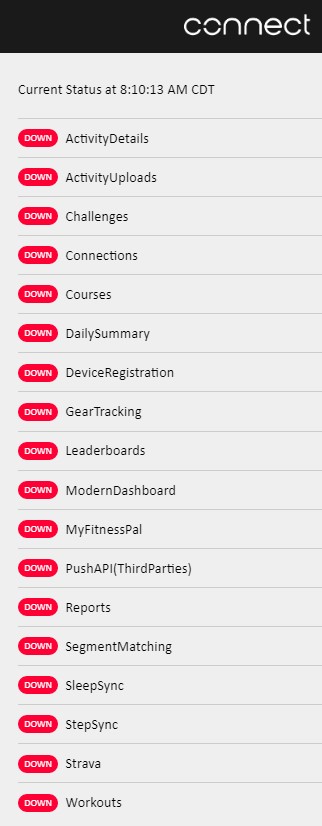
The error message on the Garmin Connect website suggests the problem is with their Cloudflare equipment:

Update: Based on Garmin employee's social-media posts, ZDNet now reports that the company experienced a catastrophic ransomware attack, most likely a new strain of WastedLocker. Fortunately, my Venu can hold 200 hours of data. So as long as they get it back up within a week or so, I shouldn't lose anything—unless the ransomware attack already destroyed my data from this past week.
Major League Baseball will start a short (60-game) season tomorrow, with weird rules (including universal DH and starting extra innings with a runner on second). The games will have piped-in audience sounds because they won't actually have audiences:
MLB is also launching an interactive website feature called "Cheer at the Ballpark" that will allow fans to cheer, clap or boo virtually, from home. The idea is that audio engineers at the ballparks can then adjust the recorded crowd sounds to reflect the fans' reactions.
So how exactly do they do it? We got a glimpse behind the scenes courtesy of Adam Peri, sound supervisor with the broadcaster Sky UK, who has his fingers on the pulse of Premier League matches.
During the broadcast, Peri sits alone in a tiny booth at Sky studios in London. He's the one responsible for punching crowd sounds into the feed.
In front of him he has a technicolor console loaded with a smorgasbord of audio clips for each team: dozens of chants — scrubbed of any offensive language-- cheers, boos, whistles and more, in varying levels of intensity.
Next to that is Peri's mixing board, with faders labeled "goal," "miss," "anticipation" and "angry."
The trick, Peri says, is that you've got to think ahead, put yourself on that field, and imagine what could happen before it does, so you can react in a flash as a fan would.
The bars in Wrigleyville will no doubt spread tons of Covid-19 tomorrow and Friday before the city-mandated closing happens Friday evening. I will stay away.
But the best news? This will be the first time since 1918 that the Cubs lose fewer than 60 games—but that season only had 131 games. You have to go back 110 years to find a season with 154 games when they lost fewer than 60.
A friend and I plan to go to a local beer garden this weekend—one on the Brews and Choos list, in fact—so we had to make a reservation that included a $7.50-per-person deposit. Things are weird, man. And if you read the news today, oh boy, the weirdness is all over:
Finally, closer to home, 4,400 restaurants in Chicago have closed because of the pandemic, 2,400 permanently. The Chicago Tribune has a list of the more notable closures.
Just a few things have cropped up in the news since yesterday:
- President Trump has threatened to send federal agents to "assist" with Chicago's efforts to curb gun violence, which no one except the Trump-supporting head of our police union wants. Michelle Goldberg calls the presence of federal agents in Portland a harbinger of fascism, while the ACLU calls it "a constitutional crisis" and has filed suit to reverse the policy.
- Also in Portland, an unidentified woman wearing only a hat and face mask nonchalantly walked in front of a row of federal police and danced for them. Said the LA Times, "She stood calmly, a surreal image of human vulnerability in the face of an overpowering force that has been criticized nationally by civil rights advocates." (Nudity is constitutionally-protected speech in Oregon.)
- The BBC also digs in and reports that the 1807 Insurrection Act prohibits this kind of federal intervention. Notably, the last time a president invoked the law against the express wishes of the state was in 1957, when Eisenhower sent troops to Arkansas to protect black children from white mobs.
- St Louis Circuit Attorney Kimberly Gardner's office filed felony charges against Mark and Patricia McCloskey for unlawful use of a weapon, but the Republican governor of Missouri has already promised to pardon the couple.
- The FBI arrested Republican Ohio House Speaker Larry Householder and three others in connection with a $60 m bribery case.
- The Boeing 747 has become the latest casualty of Covid-19, with only one airline continuing to fly the jet in passenger service.
- The Chicago Transit Authority has started round-the-clock construction on the $2.1 bn Red-Purple Modernization Project, which my alderman acknowledged would cause "massive disruption."
Finally, the Covid-19 mitigation rollback announced yesterday has led to Guthrie's Tavern closing permanently. Guthrie's, which opened in 1986 and featured board games and good beer, will pour its last pint on Thursday.
I wore both my old Fitbit Ionic and new Garmin Venu for about 42 hours straight. Yesterday they overlapped for the entire day. And they came in with similar, but not quite the same, numbers.
I thought that my Fitbit would record fewer steps overall, because it recorded about 450 (about 7%) fewer on my walk yesterday. For the whole day, though, the Fitbit counted 14,190 to the Garmin's 13,250—7% more. But I wore the Fitbit on my right (dominant) wrist, so it may have just had more activity in general.
In other basic measures:
- The Fitbit recorded 13.3 km to the Garmin's 10.6 km;
- The Fitbit estimated my resting heart rate as 64 to the Garmin's 65;
- Fitbit counted 82 "active" minutes to the Garmin's 359 "moderate" and 369 "vigorous";
- Fitbit estimated my calorie burn at 3,100 to Garmin's 2,862.
I have no way to know which tracker was more accurate, but I might bet a dollar on the Garmin. I think the Garmin used actual distance to the Fitbit's estimate based on my usual stride length, which doesn't account for all the difference.
The Garmin's app presentation is so far beyond Fitbit's I wonder whether Fitbit even has software developers. Here's Fitbit:
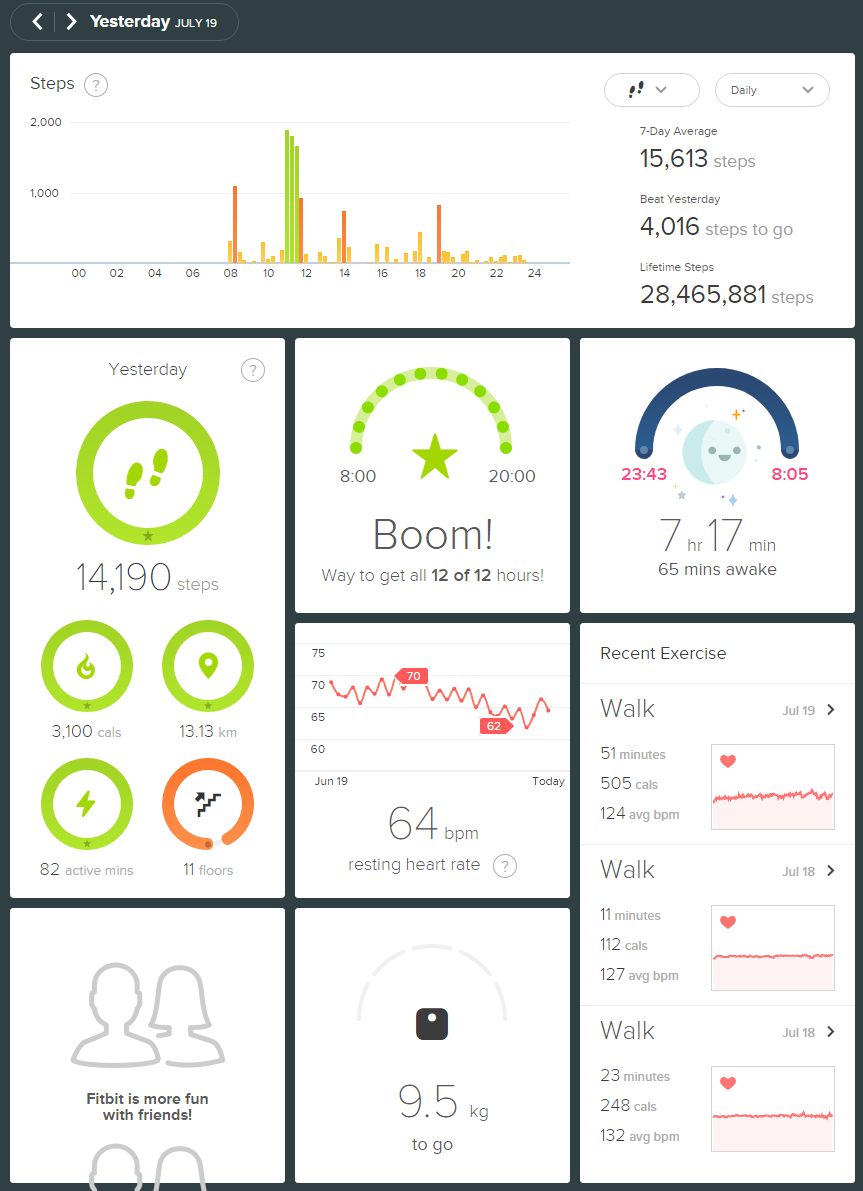
Here's Garmin's:
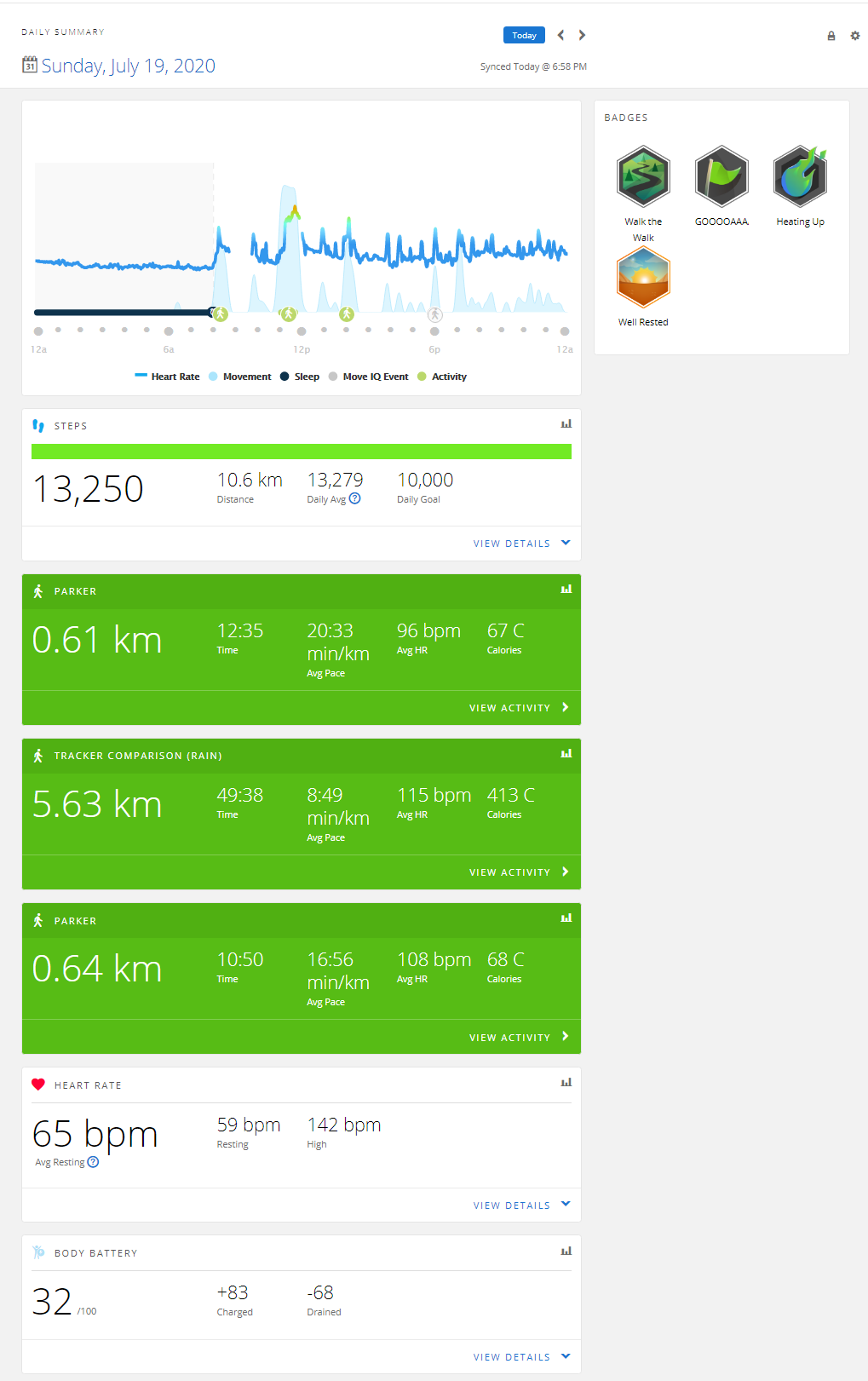
And that's not even all of the Garmin data.
I walked halfway home after work today, and once again, the Garmin tracked my workout better than the Fitbit has done in months.
I'm glad I switched.
Philip Bump puts in black-and-white terms why the president should perhaps shut up about his cognitive test results:
“And they were very surprised,” Trump said of the doctors. “They said that’s an unbelievable thing. Rarely does anybody do what you just did.”
No. That did not happen. Or, at least, it didn’t happen without a qualifier like, “rarely does anybody your age not demonstrate any of the impairments this test is meant to measure,” which is possible. But the doctors did not call this “an unbelievable thing.” It would be like my fawning over your alphabet recitation: “Wow, you even nailed the L-M-N-O-P.”
Getting a perfect score [on the cognitive test Trump took] is literally the baseline for being normal, not for being exceptional.
[P]eople were quick to point out the flip side of his boast about the doctors: Having medical professionals be amazed that you performed normally on an evaluation of your cognitive abilities is not exactly the endorsement it might have seemed like as the words were coming out of Trump’s mouth.
I would enjoy seeing the president take an IQ test, though. I would enjoy that very much.
I'll get to the final head-to-head comparison between my Garmin Venu and Fitbit Ionic later today. Meanwhile:
And finally, because our Covid-19 numbers have started creeping up, indoor bar service will halt on Friday.
Before I get to the technical bits comparing the Garmin Venu (now on my left wrist) to the Fitbit Ionic, let me just list some "learnings" today:
- Both trackers are waterproof as advertised, as is my phone.
- I am glad that I keep a towel by my back door.
- I am glad that my washing machine—and, let's face it, my dryer—is by my back door.
- There comes a point where one's clothes have absorbed so much water that it really doesn't matter how much more water they will encounter.
I have no one to blame but myself. This is the radar picture 10 minutes into the walk:
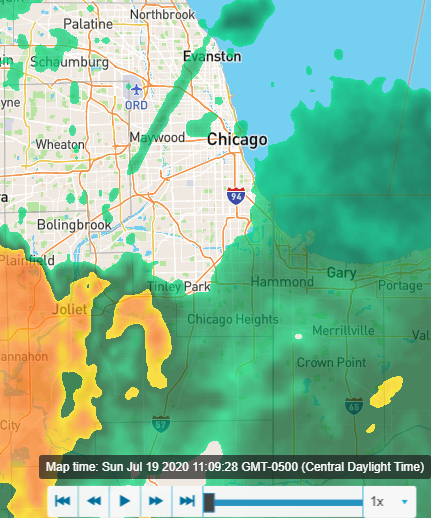
And 40 minutes in:
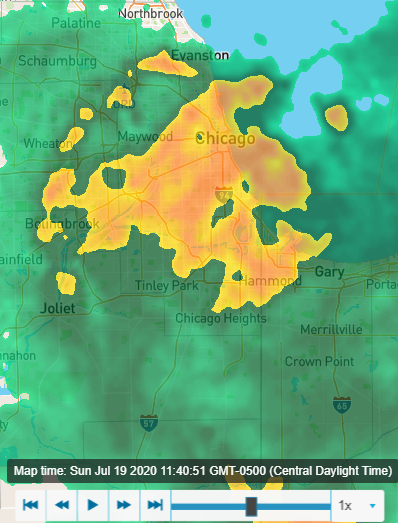
Result:

But enough about me. This post is really about fitness trackers.
In sum, the main difference between the Garmin and the Fitbit remains the Fitbit's total GPS failure, and the paucity of data Fitbit provides on its app compared with Garmin.
Here's the Fitbit data:
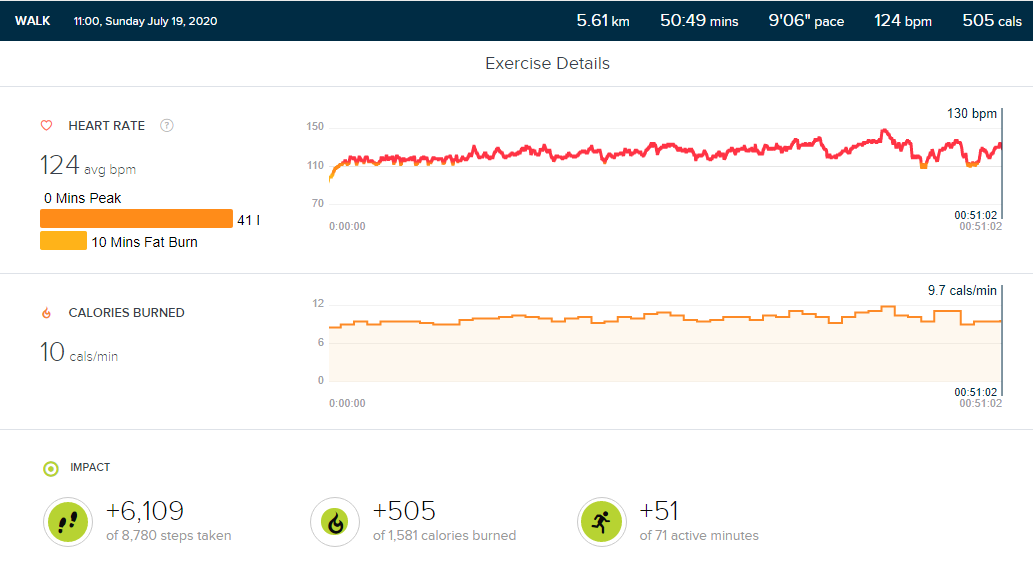
And the Garmin data:
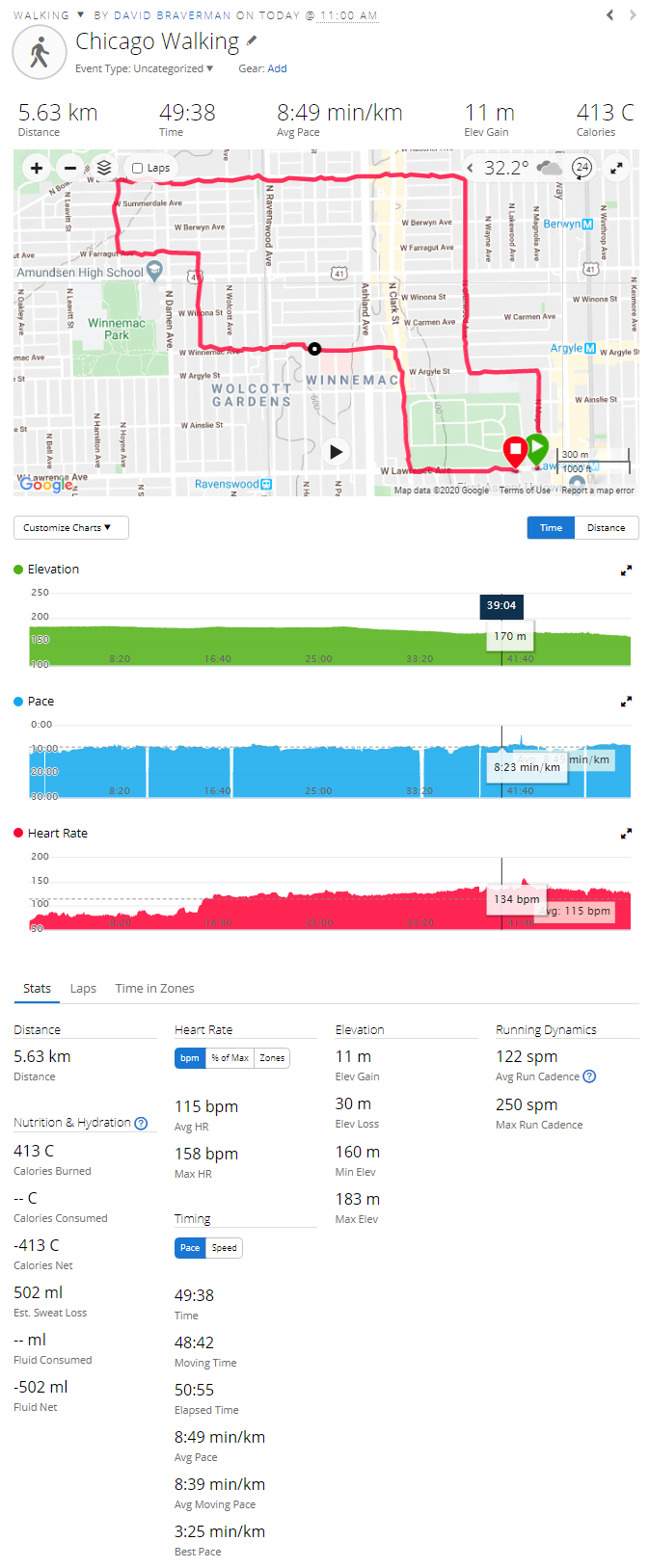
I am pleased, however, that both trackers got almost exactly the same distance, given that the Garmin tracked distance using actual data and the Fitbit guessed based on my stride length. They don't agree on how many calories I burned, how many steps I took: the Garmin said 6,556, while the Fitbit said 6,109. So far today, my Garmin says 9,127 to Fitbit's 9,047, which adds data to my hypothesis that my Fitbit has always under-counted.
So, other than the rain, I thought this test went well.